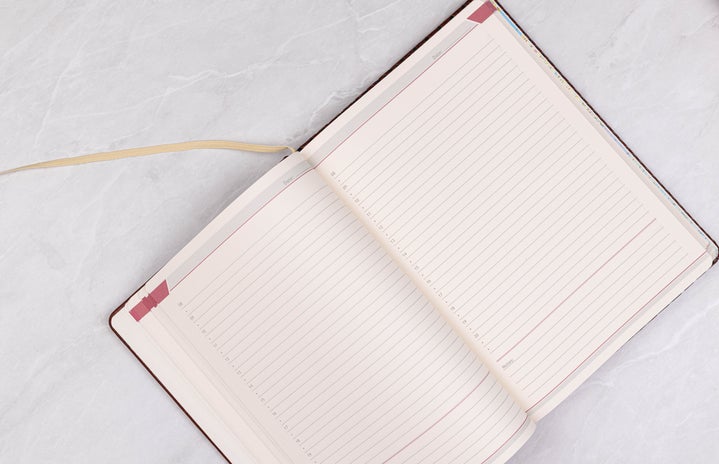When you think of journaling, you may think of your fuzzy pink diary from middle school, where you gushed over your crush and locked it away, hoping your parents would never find your secrets. Maybe you think of dreaded busy work assignments from English teachers over the years where writing down your thoughts was more like a chore. Maybe you think of Instagram activists, preaching about the benefits, but you still have your skepticisms. Whether your relationship with the practice be of love or hate, writing in a journal can really benefit your mental well-being and set you on the path to healing.
There are several different methods of journaling. It can be used as a tool to vent, write about personal events, process difficult decisions, explore your emotions, and more. The kind of journaling that I have found most helpful for the restoration of my mental health has been prompt-based journaling. Using a prompt to hone what you’re writing allows you to narrow down the goal of your experience and get to the real roots of the things you want to work on. By challenging yourself with these difficult questions, you will learn more about yourself, build self compassion, and begin to sort through things with which you may be internally struggling. The structuredness of journal prompts can be helpful in discovering ways you can experience introspection and better your mental state.
Journaling has had a significant positive effect on my mental health, and I’d like to share with you some of my favorite prompts, divided into three categories. I hope they benefit you the same way they have benefited me.
Prompts for Self Discovery:
When you practice self reflection and listen to your internal world, you discover how you can best fulfill your own emotional, physical, and spiritual needs. Use these prompts to get closer to yourself. You may be surprised by what you find.
How would someone who just met me describe me?
What is my idea of a perfect day?
Write about someone who influenced my life for better or worse.
When am I most in my element?
What was the happiest moment in my life? Describe it in detail.
How do I show my love to other people?
How do I want others to show their love to me?
What do I hope to accomplish in the next year?
Prompts for Self Compassion
Another constructive way to use the power of the pen is through practicing self kindness. Instead of self-criticism, use these prompts to develop gentleness and self acceptance. Accomplishing this will not only boost your self-esteem, but will set a baseline for how you can grow and flourish. Remember, it’s okay to be vulnerable!
Write a letter to my teenage self.
In what ways did I demonstrate resilience this week? Name three.
How can I be more gentle with myself?
What is one thing I need to forgive myself for?
What habit can I add to my morning routine to improve my day?
How do I hope to look back on myself ten years into the future?
What are some personal skills I want to develop?
Write a love letter to myself.
Prompts for Shadow Work
One of the most important lessons that I’ve learned in life is that without darkness, there is no light. Good and bad, or love and fear, exist hand in hand, and neither side of the emotional spectrum should be neglected. Those deep, aching places in you deserve to be nurtured just as much as the rest. Answering these ambitious questions can help you sort through uncomfortable, unfamiliar emotions and begin the process of healing the darkest parts of you.
What has been the hardest lesson for me to learn in the past year?
What emotion do I try to avoid? Why do I avoid it?
What is my go-to self destructive act?
What has been a recurring issue in my relationships?
How have my parents affected my sense of trust?
In what ways do I typically judge other people?
What is most of my negative self talk about?
Connect with my inner child. What do they need to hear? Write a letter to them.
These prompts may seem heavy and daunting, but the results will be worthwhile when you find a method that works for you. Different approaches work for different people, and prompts aren’t for everybody, but they are a good place to start if you need a push.
A journal doesn’t have to be an archived story of your life for your future descendants (unless that’s what you want it to be). The benefit of the practice is found in the experience itself. Even if you burn what you write or tear it to shreds and let it fly off into the wind, the important thing is that you get it out of your head and onto something else. Unlike other forms of venting, journaling can help you release pent up emotions in a safe way, for what you say will stay between you and the paper.
Remember to make the journaling process your own. Go easy on yourself and move at your own pace. Healing is not a single destination; it’s a roller coaster of ups and downs that takes a lot of effort and self-compassion. When you get to the root of your emotions and really take the time to introspect, you will discover ways in which you can help yourself heal and reach your full potential. Journaling is just one way you can get there.



